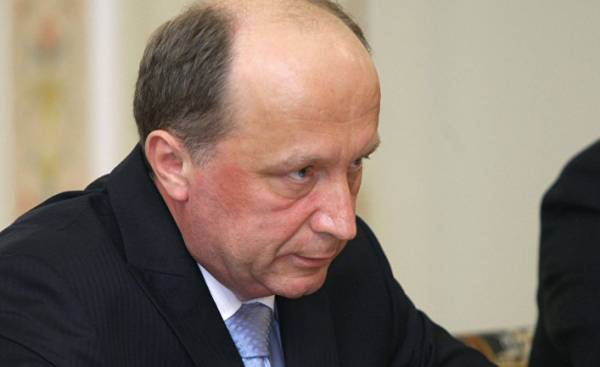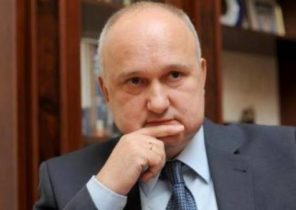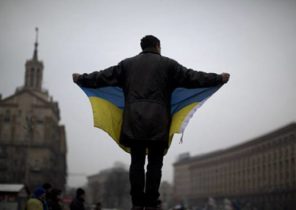
One of the key speakers at the recent Friday Kyiv Security Forum was the Andrius Kubilius — former Prime Minister and current member of the Lithuanian Parliament. However, it is interesting not their position. Kubilius — one of the authors of the so-called “Marshall plan for Ukraine”, officially supported by the European people’s party (EPP), and in Kiev spoke about this initiative. The Ukrainian side supported the initiative, although enthusiastic in the support plan with hard commitments to reform is not noticeable. In an interview with “European truth” Kubilius told about the details and prospects of the approval of a new “Marshall plan”.
“To keep you on the path of reform, need something new”
“The Ukrainian truth”: the Idea of a “Marshall plan” interesting, but how it is real?
Andrius Kubilius: It recently became more realistic, than I thought I was a month ago. In our Parliament, this plan has already been approved. At the end of March we went to the trilateral Polish-Ukrainian-Lithuanian Assembly in Warsaw and there persuaded the poles to join. Then, in late March, at the Congress of the EPP in Malta proposed a resolution supporting this plan. And I can say I was surprised at the support we received, especially from the Germans. In the end, the resolution was adopted unanimously. Along with this I saw another positive point that is directly nothing to do with Ukraine, but it shows a nice change in European politics — it is about the resolution regarding the Western Balkans. The essence of this solution: we recognize that the Western Balkans are destabilizing the Kremlin, and that the only opportunity to stabilize and not allow there to happen to do something bad — the enlargement of the European Union and membership of the Balkan countries in the EU.
— All, without exception?
— All. Don’t know in what order, whether Kosovo last or first, but support for membership has been very solid. This decision, along with Ukrainian — an indication that Europe is at least at the level of the Germans begins to understand the need to counter Russian hybrid aggression. Returning to the decision about the “Marshall plan”. The resolution adopted in Malta, it means that the “Marshall plan” for Ukraine has become the official policy of the European people’s party. That is, it is not the idea of some of the revolutionaries in the outskirts of Europe, and the initiative of the EPP. It gives us the opportunity to work in the European Parliament, to work with the European Commission, to work in Washington to take practical steps forward.
— What will include with this plan?
The philosophy plan is. Putin’s strategy is very clear — to wait, to the people here, not seeing progress, disappointed in the reforms and has chosen the path of Moldova, where, as you know, came to power Pro-Russian Dodon. How did you manage to achieve success, we, the Baltic States and Central Europe? On the way of reforms we kept what we were offered membership in the European Union. For Ukraine it is unrealistic to hope for such a prospect in a short time. To keep you on the path of reform, need something new. We came to the conclusion that this role can execute the “Marshall plan” investment package in the real economy, similar to what was after the Second world war in West Germany and in Italy.
— What kind of money are we talking about?
— There are experts. For example, your ex-Minister Natalie Jaresko believes that in 5 years you need to inject into the real economy around 25 billion dollars. Another expert, Anders Aslund, said on 5 billion per year, that is, out of the same amount. According to estimates Aslund, this would raise economic growth to 6-8% from the current 2%. “Will confront Le Pen and such, but it’s not about them”
— Do you have expectations of time — when and what steps can occur?
— Now we will deal with the creation of the coalition. At the end of April we will go to Washington, perhaps your politicians to talk about it. Then the planned trip to Brussels or to Berlin. At the end of may we plan in the Vilnius regional conference at a high level for the Nordic and Baltic countries. So 2017 will be the year of building coalition; 2018 could be the year of real projects. And it is very important to your government and Parliament also have promoted this idea as my own. And in 2019, if all goes well, it may even be approved.
— The US is ready to support this initiative?
I do not know. I hope that some clarity will appear in early may. And this is a very important question. Although the title of this project is the word “European”, we understand that without the United States and Canada will be very difficult. Therefore, we will work with Congress and with Washington think-tanks. Are counting on the support of the Ukrainian Diaspora.
— Do you think Britain will be in this project?
— I think the British could show in this project that for them the issue of security of the European continent is very important. Speaking with humor: they hurt Europe with his PACSICOM, but can compensate with money (laughs). As for Britain, there is another interesting point. The EU should develop a special status in its relations with Britain: a deep interaction, but without the common market. And I recently saw the report of the Atlantic Council, which stated that the new status of Britain can be an example for Ukraine. This status will be something intermediate between the current partnership with Ukraine and a full-fledged membership. For Ukraine, this option may not be realistic.
— Now it is the initiative of one party, the EPP. Who else is ready to support it?
— I plan to talk to Rebecca harms and counting on the support of the green at least at the European level. The social Democrats do not see a problem to get their support. In fact, you can rely on the support of all normal European parties. It is clear that will confront Le Pen and such, but it’s not about them. The only thing that can be said against what we don’t want to give any money because there is very big corruption.
— Can you give an argument against it, which may sound. In addition to investments, it is proposed to allocate to Ukraine 3% of the EU budget. And it is the European taxpayers ‘ money.
— Yes, it’s a lot of money, we are talking about 30 billion euros. This is in addition to the 5 billion a year, which we talked about. But look at our example: now Lithuania gets about 10 billion euros per year. A reduction of 3% means that we would have got 9.7 billion. Well, we would have lived. Our bureaucrats did not drink coffee on 300 million, but I don’t see big problems. Of course, other countries may object, but I don’t think it should interfere with us to come up with such an initiative. We raise this issue because now the EU is coming to discuss his new financial Outlook for 2020-27 years. Whether it will be approved — of course, there is no certainty. But such a possibility exists.
“We need those reforms that a person feels in his pocket”
25 billion euros referred to is direct money or investgarant? Grants or investment in the business?
Yet we do not go into the details, but in any case it is an investment in the real economy. They can come through privatization, and through state guarantees and capital infusion. Look at the example of postwar Germany: there was no such that, say, that bag of money Italy but the bag for Germany. Was created a special Agency to manage these money. In this case, we can clearly say that the “Marshall plan” should be with conditions. From the Ukrainian side needs to have a clear program of reforms that are a condition for receiving the money.
— Now the Ukrainian program of reforms for you is clear or not?
— Today we had Breakfast with our Lithuanian experts who work in Ukraine in different institutions. Their assessment of how the government implements certain reforms, is quite positive. Without a lot of praises, but still reforms are being implemented. Of course, I wish they were faster, but I own experience I can say that no one reform will not do.
It is interesting that the Ukrainian citizens usually say that they do not see reforms, but foreign experts say that the reforms are successful.
— Everything is very simple. People are waiting for this result of the reforms, which they felt in their everyday life: the growth of wages or the improvement of any service.
— Isn’t that supposed to be?
— Should, of course. But it takes time. First, you have to carry out reforms that change the structure of the economy, management of state enterprises, create conditions for medium-sized businesses. It is not the reforms that the person feels in his pocket. But they are needed now.
— Do not you think that now the government dries up the thirst for reform?
— Let’s look at the experience of Lithuania of the 1990s. to Sustain motivation for reform in government, in Parliament and in society very hard. Our example was even more chaotic than what is happening with you now. We are in 1990, won elections, began to reform. Two years later, I had to hold early elections. We were sure that people would be so grateful to us for independence and the reforms that we will get a majority. And the people voted against us, the former Communists! The mere fact that your society and government from the time of Maidan retains the desire to reform, and that you stay with the same Parliament is already very much. Moreover, in the case of Lithuania the country on the path of reform held that the EU started talking about the prospect of Central Europe. You don’t have it.
“Of course, there will be resistance”
— Your project “Marshall plan” is constantly repeated thesis that the next 10 years Ukraine has no prospects of EU membership. You are trying to convey this message to someone?
Yes, this message is realistic. First, I want to bring it to the Ukrainians, and secondly- to the West. We feel what is happening in the European Union. Brakcet, refugees, what is happening in America — Europe is living in a deep internal crisis. The peak of the crisis, I think we have already passed, but the output is still far. And if we are going to start knocking on doors of the EU, along with Ukraine and will say, you need to give Ukraine the prospect of membership to counter Russian aggression… If you come to Germany or France such a request, then you will look like a naive romantic who does not understand reality.
— You said that in Malta the idea of a “Marshall plan” was supported unanimously. It turns out that she was also the member parties of the EPP, who are considered friends of Russia? Italy and France were really for?
I can’t say that everything was over, but there was no one against. At the stage of negotiation, drafting committee, was objected to by the Netherlands and some other countries, but the Germans have convinced everyone else. Incidentally, in this document it’s not only about the “Marshall plan”. It also says that sanctions should be maintained until Moscow will not return control over the border; that normalization with Russia is possible only when Russia will leave Ukraine. Let me emphasize: we are not talking about that decision in Malta — final, and now for the “Marshall plan” spread out the red carpet. Of course, there will be resistance. But, most importantly, the resolution opens the door for building a coalition for the benefit of Ukraine.
— Merkel supports, but in Germany there are two key parties. Even the German Ambassador recently stated that Ukraine does not need a new “Marshall plan”. Turns out, it all depends on who wins the election — Merkel or Schultz?
— Are unable to speak with confidence about what is happening in Germany, but notice one thing. Martin Schulz has one very nice property: it believes in European institutions. He understands that in order to help Ukraine, we need a common European approach. It is a valuable. Given the experience of Schulz in the European Parliament, he understands the importance of a common policy of the European institutions.
In Central Europe, the European funds were spent on infrastructure. Is not a typical investment. And we have the infrastructure killed completely.
— Yes (laughs). I know your roads well, I’ve driven on them including Cycling around the city.
Without a fundamental upgrade of the infrastructure will be very difficult to increase the investment attractiveness of Ukraine, logistics will drag us down.
— Of course, these investments are also needed. I call them sanitation. If you have not solved this problem, it is very difficult to do something different. As for where will the money from the “Marshall plan”, and whether they will go on the road is a very good questions. But you ask them too soon. At this stage we are not yet talking about the details. We are in the stage of principled negotiation. The idea is that if the West can’t give you prospects of EU membership, it needs help in other ways: money, investment. Of course, investment in infrastructure should be part of this project. You need to show the Ukrainian society that the West supports you.
“Access to the European market — is also assistance to Ukraine”
— Talking about reforms and foreign advisers. How successful was the work of “Vikings” in the Ukrainian government? How the Ukrainian government is still listening to foreign advisers?
We also took this experience and know that the advisors are different. Some useful, others don’t really understand what they are doing on this post.
— What reforms were successfully adopted in Ukraine with the filing of the foreign experts, where was the failure?
— When Abromavicius was a Minister, he took to the Ukraine several experts and the experience of our economy. They did some very good deeds. The same Prozorro — now we have to learn from you. As for what to do: the need for reform of management of state enterprises. You need to take 50 key state-owned enterprises and to make reforms in them. And the rest… need something to privatise, to reform something, but you definitely don’t need 3 thousand state enterprises.
The next important step is land reform. We go the same way. Like you, we all feared the privatization of land. Said that come the Western capital, there will be problems, the agricultural sector will die. The result was that the agricultural sector has received from joining the EU and remained stable after the crisis. You do realize that half the European budget goes to support the agricultural sector.
But we do not Shine, the money will go only to the member countries.
— Yes, I understand, and we think about it. Ukraine must be maintained not only through investment. You also need to change the terms of your contract on free trade, to increase the quota. In some sectors you have such small quotas that they are exhausted in one day. This means that you need to work to change the quota when the agreement is finally ratified. Your access to the European market — is also assistance to Ukraine, and it is part of the “Marshall plan”.







